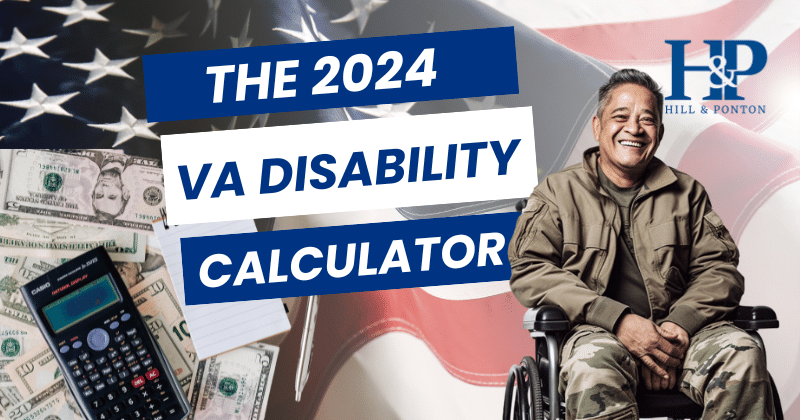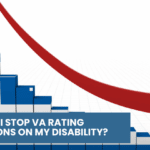If you’ve served in the military, understanding how the VA determines your disability rating is crucial.
It affects the support and compensation you should receive for your service.
In this guide, we hope to enlighten you about:
- 2024 VA Payment Schedule
- How VA Ratings are Determined
- How VA Ratings are Calculated
- How Ratings are Combined
- The Annual COLA Adjustment and How it Impacts Your Benefits
And… if you really don’t want to worry about the VA’s complicated (and lengthy) tables, we’ve got a simple tool that will save you time and effort, too!
Want to skip the read? Get info about VA Ratings on our video guide below.
When will my VA check be deposited? 2024 VA Payment Schedule
As a veteran relying on VA benefits, it’s important to know when you can expect your payments.
Understanding the 2024 VA Payment Schedule helps you plan your finances effectively.
We’ve created a detailed table that outlines each month’s payment date and the corresponding day of the week for your convenience.
Key Points to Remember
- Monthly Payments: VA disability compensation is paid monthly. The payment you receive each month is for the previous month. For example, the payment received in February is for January.
- Scheduled Dates: The VA typically deposits payments on the first business day of each month. If the first day of the month falls on a weekend or a holiday, the payment is made on the last business day before the first.
- Direct Deposit: Signing up for direct deposit is the most efficient way to receive your payments. It’s secure, and funds are usually available sooner compared to traditional mail.
- Planning Ahead: The provided table will help you know exactly when funds will be available in your account, allowing you to manage your expenses and budget accordingly.
- Adjustments for COLA: Keep in mind that any cost-of-living adjustments (COLA) will be reflected in these payments, ensuring that your benefits keep pace with inflation.
Using the 2024 VA Payment Schedule Table
Below is our easy-to-use 2024 VA Payment Schedule table.
It lists each month’s payment date along with the day of the week, giving you a clear overview of when to expect your benefits throughout the year.
This information is invaluable for budgeting, scheduling bill payments, and planning for the year ahead.
| Month | Payment Date | Day of Week |
| Jan 2024 | Feb 1 | Thurs |
| Feb 2024 | March 1 | Fri |
| March 2024 | April 1 | Mon |
| April 2024 | May 1 | Wed |
| May 2024 | May 31 | Fri |
| June 2024 | July 1 | Mon |
| July 2024 | Aug 1 | Thurs |
| Aug 2024 | Aug 30 | Fri |
| Sept 2024 | Oct 1 | Tues |
| Oct 2024 | Nov 1 | Fri |
| Nov 2024 | Nov 29 | Fri |
| Dec 2024 | Dec 31 | Tues |
How are VA Ratings Determined?
Understanding how the VA determines your disability rating can help you as a veteran in a variety of ways.
This rating is a key factor in deciding the benefits you receive.
It also represents how much your service-connected injury or illness affects your daily life and work.
Step 1: Filing a Claim
The process begins when you file a claim with the VA. This is an important step where you tell the VA about your health condition and how it’s connected to your military service. It’s vital to provide as much information as possible, including medical records, doctor’s statements, and any other evidence that shows how your condition is linked to your service.
Step 2: VA Review
After you submit your claim, the VA reviews all the information you’ve provided. They might also ask you to attend a medical examination. This exam is conducted by a VA doctor or a VA-approved health professional. They assess your condition in detail and report back to the VA.
Step 3: Evaluating Evidence
The VA then evaluates all the evidence. This includes your medical records, examination results, and any other documents you’ve submitted. They look at how severe your condition is, how it impacts your ability to work, and what kind of treatment you’re receiving.
Step 4: Determining the Rating
Based on this evaluation, the VA assigns a rating to your condition. This rating is given in 10% increments, ranging from 0% to 100%. A higher percentage indicates a more severe disability. For example, a 10% rating may be given for a minor condition with limited impact on your daily life, while a more severe condition that greatly affects your ability to work could receive a rating of 70% or higher.
Understanding the Cost of Living Adjustment (COLA) Effects on Ratings
Each year, your VA benefits may increase slightly due to the Cost-of-Living Adjustment (COLA).
This adjustment ensures your benefits keep up with inflation.
For example, if prices go up, COLA increases your benefits, so your purchasing power remains the same.
Want to learn more about the COLA adjustments? Find out up-to-date information in our guide.
What will your VA disability pay increase look like this year? Find out by clicking here.
How are VA Ratings Calculated?
Figuring out how the VA calculates your disability rating might seem tricky at first, but it’s important to grasp this process.
It helps you understand the financial support you can expect based on your service-connected disability.
The Basics of VA Rating Percentages
Every disability that the VA recognizes is assigned a percentage.
This percentage, ranging from 0% to 100%, reflects how much your disability affects you.
A higher percentage means a more severe impact on your daily life and work capabilities.
How Percentages Are Assigned
To assign these percentages, the VA looks at specific criteria for each type of disability.
These criteria are detailed in the VA’s rating schedule, which describes various symptoms and conditions.
For example, if you have a knee injury, the VA will check how much your knee’s motion is limited and assign a percentage based on that.
Considering Severity and Impact
The VA considers both the medical severity of your condition and how it affects your life.
For instance, a condition that causes severe pain and limits your ability to work might receive a higher percentage than a condition with manageable symptoms.
Individual vs. Multiple Disabilities
If you have just one disability, the VA gives you a single percentage rating.
But if you have multiple disabilities, each gets its own percentage.
Then, these are combined using VA’s special formula, not just by adding them up.
This is important because the way the VA combines percentages can affect your overall disability rating.
Want to learn more about combined disability ratings and VA math? Read our guide.
What’s your rating going to be with more that one disability? Click here to learn more!
Why Worry About All the VA’s Complicated Tables When We’ve Done the Work for You?
Navigating the VA’s complex disability rating tables can be overwhelming and confusing.
That’s where our VA Disability Calculator comes in – a tool specifically designed to save you time and effort!
With just a few clicks, you can gain insights into:
- Your Expected Disability Rating: No more guessing or trying to interpret complicated tables. Our calculator provides a clear estimation of the rating percentage for your specific condition or combined conditions.
- Your Potential Compensation: Understand the financial support you might be eligible for. Our calculator breaks down the compensation tied to various disability ratings, giving you a clear picture of your potential benefits.
Ready to find out what your VA disability rating and compensation could look like? Try it now.













